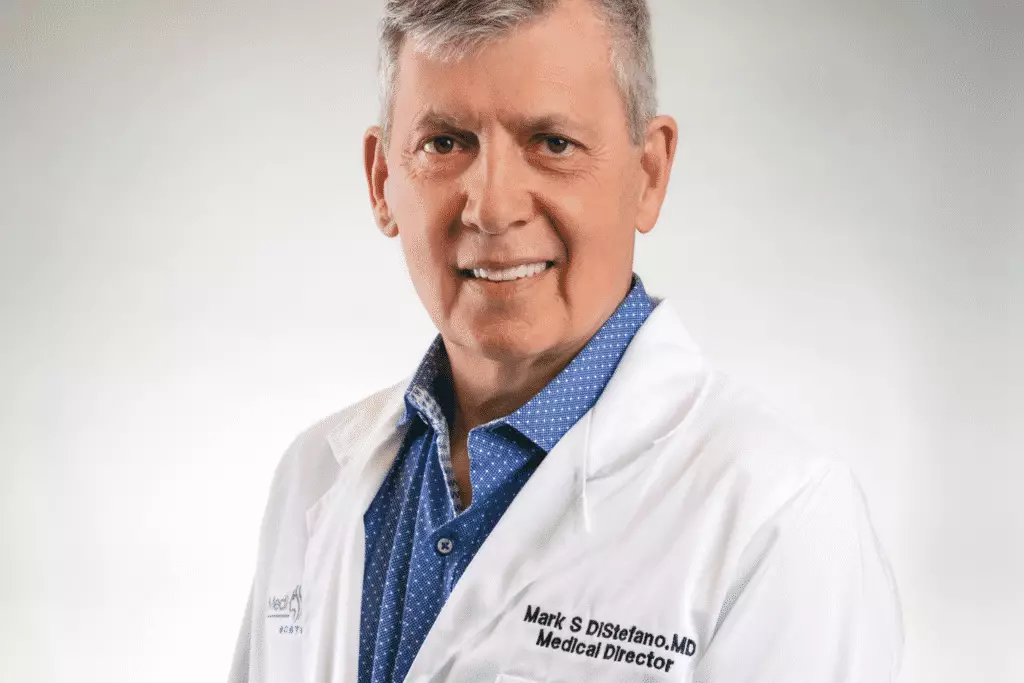
We are starting a new blog series called "Get to Know Our Team" where we are highlighting members of our team. The first team member we are highlighting is Dr. Mark DiStefano who recently took on a larger role at our practice when he was named Chief of Surgery of Medi Tresse.
What is your role at Medi Tresse?
I am the Medical Director of Medi Tresse Westchester, which is a role I have held since March of 2018. In August, due to patient demand, Medi Tresse made the decision to start offering hair restoration surgery and I was named the Chief of Surgery of Medi Tresse. As Chief of Surgery I see patients at the Medi Tresse Boston, Medi Tresse Worcester, and Medi Tresse Scarsdale offices.
What is your experience treating hair loss and specifically female hair loss?
I started treating hair loss over 25 years ago and have treated thousands of patients both men and women. I have performed over 10,000 surgical hair restoration procedures, of which roughly 1,500 of those procedures were performed on women.
You have performed significantly more surgical procedures on men than women, is there a reason for that?
There are really a couple of reasons for that. The first is that in my experience hair loss in men is more accepted in society, so men feel more comfortable seeking treatment. Many of the female patients I have met with often share stories of trying to hide their hair loss for years before finally deciding to seek treatment. The second reason is that surgery is often a better option for male patients than for female patients, especially with some of the great non-surgical options now available to women. Female patients used to make up 20% of my surgeries just 15 years ago, but now they only make up between 5-10%. For many women Optimal Platelet Concentration™ Therapy, Platelet Rich Plasma (PRP) Therapy, or Low Level Laser Therapy are better options.
Why are non-surgical options better for many women?
Women have diffuse hair loss which is more responsive to medical treatment versus surgical treatment. Men tend to have the horseshoe pattern and this is less amenable to medical therapies, so surgery is often a better option.
Are any women good candidates for hair restoration surgery?
Absolutely, but we need to make sure the patient has a strong donor area, which is where we take the hairs from to transplant. As many women experience diffuse thinning, or hair loss throughout, we need to make sure that the donor area has enough density to transplant from. A hair transplant is the only way to get hair in a place it did not exist before, so for patients looking to add density to an area or move their hair line, a hair transplant can be a very good option.
Do you enjoy what you do?
I have been blessed because for the last 27 years I have had the privilege to practice hair restoration, which has given me the opportunity to help thousands of people restore their hair, but more importantly their confidence. I have been fortunate enough to train 15 physicians throughout the world in hair restoration and I have taught at conferences all over the world. This has allowed me to meet physicians and patients from all walks of life. Hair restoration has been my passion and the journey was so much more rewarding than I could have ever imagined.
In August 2019 Medi Tresse began offering hair restoration surgery with Mark DiStefano, MD. Dr. DiStefano is a Certified Diplomate of the American Board of Hair Restoration Surgery, a Fellow of the International Board of Hair Restoration Surgery, and member of the European Society of Hair Restoration. Dr. DiStefano has specialized in the treatment of hair loss for over 25 years and has treated more than 2,500 women for hair loss. He is world-renowned and has been described by his peers as one of the best hair transplant surgeons in the world. If you are interested in having a hair transplant consultation with Dr. DiStefano contact our office today.